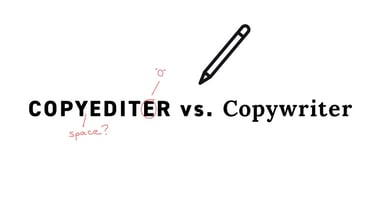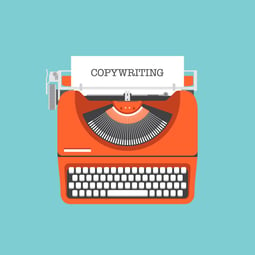All Writers are not created equal. Not only are there differences in skill sets, there are also different kinds of copy that need to be written and edited. It’s true that finding a good writer is hard, but trust us, finding a good editor is also tough. While writing copy is an art (and a science for technical writers), editing is all about the science of grammar, sentence structure, and the weight and meaning of the content.
Copyeditors are both similar to and different from Copywriters. In fact, you can’t have strong copy without both a Copywriter and a Copyeditor. (Also, a Proofreader.)
This article will clear up any confusion you might have about these jobs.
Chicken or the Egg? All Copy Starts with Copywriting
/Improve%20Your%20Career%20Network.jpg?width=1400&name=Improve%20Your%20Career%20Network.jpg)
Let’s start with the copy itself. That’s what both copyediting and copywriting are about. For the past decade, as digital technology has allowed us to be online 24/7/365, copywriting has been elevated to a more in-demand role.
Who do you think comes up with all of the professional video and written content that you’ve been perusing?
Copywriters.
/OLD%20Social_Imagery/GIFs/Peggy%20Olson%20Gif.gif?width=500&name=Peggy%20Olson%20Gif.gif)
If you’re a fan of AMC’s Mad Men, you may kind of understand what they do. Think Peggy Olson, the character played by The Handmaid’s Tale actress Elisabeth Moss. However, today, most Copywriters wouldn’t be caught dead wearing pearls and working in an office.
What Does a Copywriter Do?
Copywriters write copy. Today, they work from everywhere, from Starbucks to a traditional office, on planes, and in their backyards.
The content they write includes:
- Articles for publication
- Blogs
- Catalog descriptions
- E-books
- Emails
- Novels and short stories
- Scripts for video, TV, radio, and more
- Social media posts
- Speeches
- Technical manuals
- Webpages and landing pages
- White papers
We should note that Copywriters are different from Writers or Novelists or Poets. Copywriters usually write content designed to sell something. However, they may also write novels, short stories, or e-books designed to educate or inspire.
Basically, Copywriters write almost anything. They have a good grasp of the native language they’re writing in, and they have a strong creative bent that lets them look at things in new ways. They must love to write, of course — that’s a given.
Some of the other characteristics of a good copywriter include:
- A curious mind
- The ability to organize thoughts into a cohesive piece
- Research skills
- An understanding of the emotions that good copy can elicit
- The ability to work SEO keywords into copy in a way that doesn't seem unnatural
- The ability to write while under deadline pressure
- Responsible, yet creative
- Attention to detail
- Self-editing by using digital grammar and spellcheckers
- Comprehension of the written word
- Writing quickly but intelligently
- The ability to receive editing without feeling insulted
It’s this last bullet that we should tackle for a moment. Every Copywriter needs someone to check his or her work. That’s because after staring at a screen for eight hours (or even two), Copywriters get something called “brain fatigue” — not to mention eye strain.
That’s where a Copyeditor can be a lifesaver.
Even Stephen King Has a Copyeditor
/Buzzwords.jpg?width=720&name=Buzzwords.jpg)
Behind every good Copywriter is a Copyeditor*.
*Writer's Note: Hi Meredith!
While Stephen King could publish his grocery list and make a million bucks, even he has a Copyeditor catch all of his mistakes before publishing. Some Writers run copy by a family member, friend, or other trusted advisor before it goes to a Copyeditor. A true story we've heard: Stephen King runs a lot of his copy through Tabitha (his wife) or his kids — one of them writes under the pseudonym Joe Hill.
Apologies for the red herring.
Speaking of distracting you from the point by introducing another point, a Copyeditor will spot that in a hot minute**. (A Copyeditor would also spot the cliché in the last sentence.)
**Editor's Note: I left it so the Copywriter could make her point.
What Does a Copyeditor Do?
A Copyeditor concerns themselves with things like voice and structure. If there are characters developed within the content, the Copyeditor will make sure their voices sound both plausible and consistent. They’ll make sure the lead-in on a blog isn’t too long. Sometimes, they’ll rewrite a sentence so it makes more sense.
But Copyeditors also have a bigger role, which is to maintain a certain thematic approach across a body of copy. Their job is to make sure the copy follows brand standards, whatever those may be. In addition to scouting for typos, they have a hand in page layout, sometimes graphics selection, headline composition, and if the content is online, SEO.
They may handle an editorial calendar of publication dates, titles, and types of content. Copyeditors sometimes write up the copy requirements and give the assignment to a Copywriter.
Additionally, Copyeditors often serve as the liaison between the Copywriter and the client, or business owners, or even publishers. While a Copywriter can toil away in the privacy of their own head, a Copyeditor needs to have some customer service skills, as well. In some instances, a Copywriter’s work goes straight to the Copyeditor. Sometimes, the Copyeditor is lucky enough to have a Proofreader between the Copywriter and their work.
But Wait. What About Proofreaders?
/Human%20Centered%20Search.jpg?width=720&name=Human%20Centered%20Search.jpg)
For a larger organization, a Proofreader may eliminate some of the tedious work of checking content for spelling or grammatical errors. Proofreaders have skills different from both Copywriters and Copyeditors. Proofreaders are language geeks. They are sticklers for proper grammar, spelling, and punctuation. They are devoted to paying meticulous attention to errors whenever and wherever they occur.
Think of a Copywriter as a creative writer, the Copyeditor as the copy boss, and the Proofreader as the big nerdy language geek.
While they all deal with the written word in its various forms, they all have really different jobs. But all three gigs are particularly important in today’s content-driven business world.
The Final Word
Copywriters are different from Copyeditors and Proofreaders. But Copyeditors may use some of the same skills that Proofreaders and Copywriters employ and vice versa. There are some Copywriters who can actually turn in copy without errors, a skill that puts them in very high demand!
You could need one, two, or all three of these professionals.
Here is the good news: Artisan Talent has all of them! There are many great Copywriters, Copyeditors, and Proofreaders available for work. Need to hire one? Let us know.
If you’re not sure what type of creative talent you need or are having trouble finding a competent and responsive writer, contact us. We can help.





